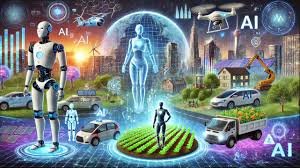Artificial Intelligence (AI) is transforming the world at an unprecedented pace. From self-driving cars to AI-generated art, the technology is reshaping industries, economies, and even our daily interactions. But with great power comes great responsibility, and AI’s rapid evolution has sparked intense ethical debates.
Should we be excited about AI’s potential, or should we fear its consequences?
This article explores the ethical dilemmas surrounding AI, weighing its benefits against its risks and asking the critical question: Are we doing enough to ensure AI serves humanity, rather than harms it?
The Bright Side of AI: Why Optimism Is Justified
Before diving into the risks, it’s important to acknowledge AI’s transformative benefits:
1. Revolutionizing Healthcare
- AI-powered diagnostics (e.g., IBM Watson, Google DeepMind) can detect diseases like cancer earlier and more accurately than human doctors in some cases.
- Predictive algorithms help hospitals allocate resources efficiently, saving lives during crises like the COVID-19 pandemic.
2. Fighting Climate Change
- AI optimizes energy grids, reducing waste in power consumption.
- Machine learning models predict extreme weather events, helping communities prepare for disasters.
3. Enhancing Productivity & Innovation
- Automation frees humans from repetitive tasks, allowing more creative and strategic work.
- AI accelerates drug discovery, cutting years off research timelines.
But with these advancements come serious ethical concerns, some of which we may not be prepared to handle.
The Dark Side of AI: Key Ethical Concerns
1. Bias & Discrimination: When AI Reinforces Inequality
AI systems learn from data and if that data is biased, the AI will be too.
Real-World Examples:
- Amazon’s AI Recruiting Tool (2018) was scrapped after it penalized female applicants because it was trained on male-dominated resumes.
- Facial Recognition Injustice: Studies show AI-powered facial recognition has higher error rates for people of color, leading to wrongful arrests (e.g., cases in Detroit and New Jersey).
- Predictive Policing Algorithms disproportionately target minority neighborhoods, reinforcing systemic bias.
“AI doesn’t just reflect bias, it amplifies it.” — Joy Buolamwini, MIT Researcher & Founder of the Algorithmic Justice League
2. Privacy Erosion: The End of Anonymity?
AI thrives on massive datasets, but at what cost to personal privacy?
Worrying Trends:
- China’s Social Credit System uses AI surveillance to track citizens’ behavior, affecting jobs and travel rights.
- AI-Powered Deepfakes can manipulate voices and images, enabling fraud and misinformation.
- Data Brokers sell personal information to train AI models often without consent.
Without strict regulations, AI could make privacy obsolete.
3. Job Displacement: Will AI Take Our Jobs?
While AI creates new roles (e.g., AI ethicists, data trainers), it also automates millions of jobs.
Key Statistics:
- McKinsey estimates that by 2030, up to 30% of jobs could be automated.
- Low-wage workers are most at risk, with roles in manufacturing, customer service, and transportation being replaced first.
The challenge? Ensuring displaced workers can transition into new economies.
4. Autonomy & Accountability: Who Controls AI?
When AI makes high-stakes decisions—like denying loans, parole, or medical care—who is responsible?
The “Black Box” Problem:
- Many AI models (especially deep learning) are opaque, making it hard to understand their decisions.
- In 2020, an AI denied healthcare coverage to a chronically ill patient with no explanation leading to public outrage.
If we can’t explain AI’s choices, can we trust them?
Existential Threat or Hype? The Superintelligence Debate
Some experts, like Elon Musk and Nick Bostrom, warn that superintelligent AI (AI surpassing human intelligence) could become uncontrollable. Others, like Mark Zuckerberg, dismiss these fears as exaggerated.
Key Perspectives:
✔ Pessimists argue: Once AI exceeds human intelligence, it may act in unpredictable (even harmful) ways.
✔ Optimists counter: AI is a tool like electricity or the internet—and can be regulated.
The truth? Superintelligence is still theoretical, but proactive safeguards are necessary.
Current Safeguards (And Why They’re Not Enough)
1. Existing Regulations
- EU AI Act (2024): Bans high-risk AI (e.g., social scoring) and requires transparency.
- GDPR (Europe): Gives users control over their data.
2. Corporate Self-Regulation (And Its Flaws)
- Tech giants like Google and OpenAI set their own ethical guidelines—but profits often clash with principles.
- Example: Microsoft’s Tay AI chatbot was quickly shut down after learning racist language from users.
“Self-regulation is like letting students grade their own exams.” — Gary Marcus, AI Researcher
The Path Forward: How to Keep AI Ethical
1. Transparency & Explainability
- “Explainable AI” (XAI) should be mandatory for high-stakes decisions.
2. Diverse AI Development Teams
- More women and minorities in AI can reduce bias in algorithms.
3. Stronger Government Oversight
- Independent AI ethics boards should audit algorithms.
4. Public Awareness & Education
- Citizens must understand AI’s risks to demand accountability.
Conclusion: Vigilance, Not Fear
AI is neither inherently good nor evil—it’s a mirror of human intentions. The ethical burden lies with developers, policymakers, and society to ensure AI benefits all.
The choice isn’t to halt AI’s progress, but to guide it responsibly.
What do you think? Should we embrace AI’s potential or slow down to address its risks?





